有声英文阅读-睡觉,偶尔做做梦
暑假英语阅读第19期Dreams【关于做梦这件事】
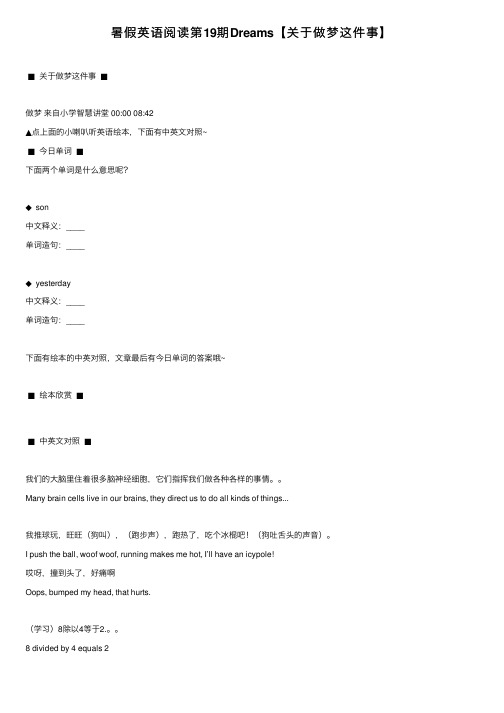
暑假英语阅读第19期Dreams【关于做梦这件事】■关于做梦这件事■做梦来⾃⼩学智慧讲堂 00:00 08:42▲点上⾯的⼩喇叭听英语绘本,下⾯有中英⽂对照~■今⽇单词■下⾯两个单词是什么意思呢?◆ son中⽂释义:____单词造句:____◆ yesterday中⽂释义:____单词造句:____下⾯有绘本的中英对照,⽂章最后有今⽇单词的答案哦~■绘本欣赏■■中英⽂对照■我们的⼤脑⾥住着很多脑神经细胞,它们指挥我们做各种各样的事情。
Many brain cells live in our brains, they direct us to do all kinds of things...我推球玩,旺旺(狗叫),(跑步声),跑热了,吃个冰棍吧!(狗吐⾆头的声⾳)。
I push the ball, woof woof, running makes me hot, I’ll have an icypole!哎呀,撞到头了,好痛啊Oops, bumped my head, that hurts.(学习)8除以4等于2.。
8 divided by 4 equals 2做着做着,⼀部分脑神经细胞说After a while, some brain cells say.累了累了。
Tired哎,困了困了。
Sleepy睡吧,睡吧。
Time to go to sleep看上去我们睡着了,但是有⼀部分脑神经细胞不肯睡啊。
Looks like we’re asleep, but some brain cells refuse to sleep.他们在⼲什么呢。
在造梦啊!What are they doing...they’re making dreams!看他脑⼦⾥的事情真多呢,愿望啊,记忆啊,⼼事啊,全部把它们打乱吧。
Look at all the stuff in his head, wishes, memories, thoughts, let’s jumble it up.还要加些佐料啊,和⾝体有关的事情,和他毫⽆关系的事情,还有X#%&(&Y (不知所云的电⼦声)Add some spices, stuff to do with the body, stuff unrelated to him, and....⼀⼤团的梦境啊,要上演啦。
睡觉做梦的英文作文初一
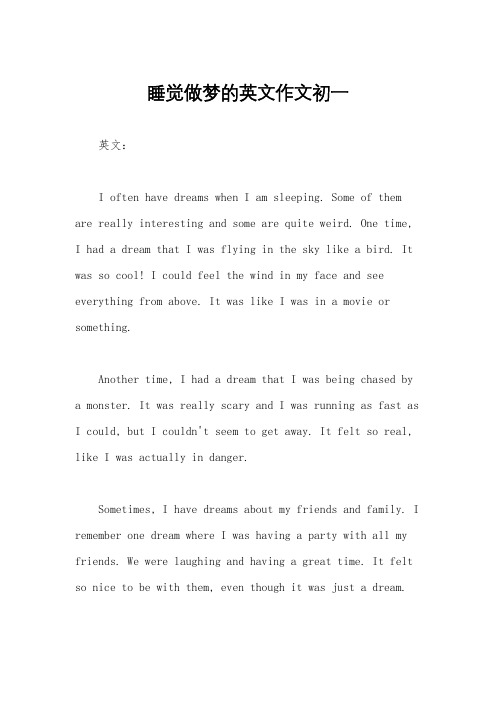
睡觉做梦的英文作文初一英文:I often have dreams when I am sleeping. Some of them are really interesting and some are quite weird. One time, I had a dream that I was flying in the sky like a bird. It was so cool! I could feel the wind in my face and see everything from above. It was like I was in a movie or something.Another time, I had a dream that I was being chased by a monster. It was really scary and I was running as fast as I could, but I couldn't seem to get away. It felt so real, like I was actually in danger.Sometimes, I have dreams about my friends and family. I remember one dream where I was having a party with all my friends. We were laughing and having a great time. It felt so nice to be with them, even though it was just a dream.I think dreams are really interesting because they can be so different each time. Sometimes they can be reallyvivid and other times they are just a blur. I wonder why we dream and what they really mean.中文:我睡觉的时候经常做梦。
英语四级阅读模拟训练附答案和精讲 第40篇-梦

英语四级阅读模拟训练附答案和精讲第40篇:梦Of all the components of a good night's sleep, dreams seem to be least within our control. In dreams, a window opens into a world where logic is suspended and dead people speak. A century ago, Freud formulated his revolutionary theory that dreams were the disguised shadows of our unconscious desires and fears; by thelate 1970s, neurologists had switched to thinking of them as just "mental noise"-the random byproducts of the neural repair work that goes on during sleep. Now researchers suspect that dreams are part of the mind's emotional thermostat, regulating moods while the brain is "off line." And one leading authority says that these intensely powerful mental events can be not only harnessed but actually brought under conscious control, to help us sleep and feel better. "It's your dream," says Rosalind Cartwright, chair of psychologyat Chicago's Medical Center, "if you don't like it, change it."he link between dreams and emotions shows up among the patients in Cartwright's clinic. Most people seem to have more bad dreams early in the night, progressing toward happier onesbefore awakening, suggesting that they are working through negative feelings generated during the day. Because our conscious mind is occupied with daily life we don't always think about the emotional significance of the day's events-until, it appears, we begin to dream.And this process need not be left to the unconscious. Cartwright believes one can exercise conscious control over recurring bad dreams. As soon as you awaken, identify what is upsetting about the dream. Visualizehow you would like it to end instead; the next time it occurs, try to wake up just enough to control its course. With much practice people can learn to, literally, do it in their sleep.At the end of the day, there's probably little reason to pay attention to our dreams at all unless they keep us from sleeping or "we wake up in panic," Cartwright says. Terrorism, economic uncertainties and general feelings of insecurity have increased people's anxiety. Those suffering from persistent nightmares should seek help from a therapist. For the rest of us, the brain has its ways of working through bad feelings.Sleep-or rather dream-on it and you'll feel better in the morning.练习题:Choose correct answers to the question:1.By saying that “dreams are part of the mind's emotional thermostat," (Lines 4-5, Para. 1) the researchers mean that _______.A.we can think logically in the dreams tooB.dreams can be brought under conscious controlC.dreams represent our unconscious desires and fearsD.dreams can help us keep our mood comparatively stable2.What did Cartwright find in her clinic?A.Most bad dreams were followed by happier ones.B.Divorced couples usually have more bad dreams.C.One’s dreaming process is related to his emotion.D.People having negative feelings dream more often.3.Cartwright believed with much practice,we can learn to _____.A.control what dreams to dreamB.sleep well without any dreamsC.wake up in time to stop the bad dreamsD.identify what is upsetting about the dreams4.The author points out that a person who has constant bad dreams should ______A.learn to control his dreamsB.consult a doctorC.sleep and dream on itD.get rid of anxiety first5.The author most probably thinks that controlling dreams is ______.A.a good practiceB.a new discoveryC.helpful for everyoneD.not essential for everyone1.[D] 词义理解题。
关于做梦的英语阅读理解

关于做梦的英语阅读理解Title: Decoding Dreams: An English Reading Comprehension ExerciseIntroduction:Dreams have always been a fascinating and mysterious aspect of human experience.They can range from mundane memories to surreal fantasies.This English reading comprehension exercise aims to enhance your understanding of dreams and their interpretations.Reading Passage:Dreams are the succession of images, ideas, emotions, and sensations that occur involuntarily in the mind during certain stages of sleep.They can last for a few seconds to as long as 30 minutes.While the exact purpose of dreams is still a subject of debate among scientists, there are several theories that attempt to explain their significance.One popular theory is Sigmund Freud"s psychoanalytic theory, which suggests that dreams are a manifestation of repressed desires and unconscious thoughts.According to Freud, the content of dreams is symbolic, and they serve as a way for the unconscious mind to express itself.Another theory is the activation-synthesis hypothesis, proposed by Harvard psychologist J.Allan Hobson.This theory suggests that dreamsare a result of random neural activity in the brain during sleep.The brain tries to make sense of this activity by creating a story-like sequence of events, which we perceive as dreams.Regardless of their purpose, dreams can have a significant impact on our emotional well-being.They can help us process emotions, solve problems, and gain insights into our subconscious minds.Some people even claim to have experienced creative breakthroughs through their dreams.Exercise:1.What are dreams defined as in the passage?a) Voluntary thoughts during sleepb) Involuntary images and sensations during sleepc) Conscious experiences while awake2.How long can dreams last according to the passage?a) A few minutesb) 30 minutesc) Several hours3.What is one theory that explains the purpose of dreams?a) Dreams are a manifestation of conscious desiresb) Dreams serve as a way to express unconscious thoughtsc) Dreams are a result of external stimuli4.Who proposed the activation-synthesis hypothesis?a) Sigmund Freudb) J.Allan Hobsonc) Carl Jung5.How can dreams impact our emotional well-being, according to the passage?a) By causing confusion and distressb) By helping us process emotions and solve problemsc) By providing irrelevant informationAnswers:1.b) Involuntary images and sensations during sleep2.b) 30 minutes3.b) Dreams serve as a way to express unconscious thoughts4.b) J.Allan Hobson5.b) By helping us process emotions and solve problemsConclusion:Understanding dreams and their interpretations can provide valuable insights into our subconscious minds.This reading comprehension exercise has explored various theories about dreams and their impact on our emotional well-being.By engaging with the exercise, you have gained a deeper understanding of this intriguing aspect of human cognition.。
睡觉做梦的英文作文初中
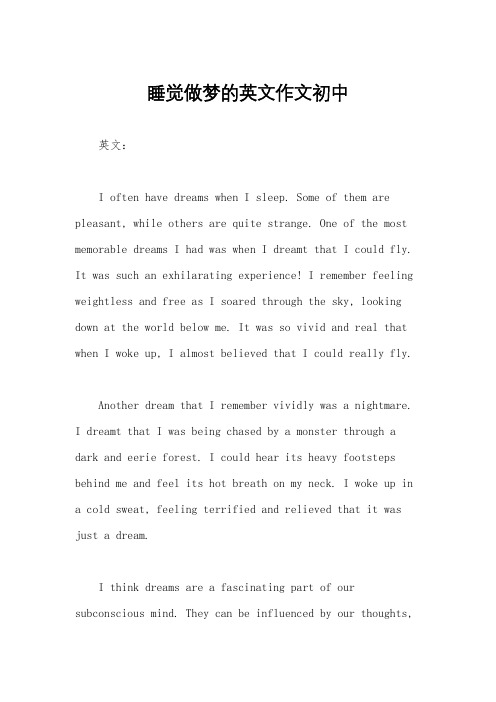
睡觉做梦的英文作文初中英文:I often have dreams when I sleep. Some of them are pleasant, while others are quite strange. One of the most memorable dreams I had was when I dreamt that I could fly. It was such an exhilarating experience! I remember feeling weightless and free as I soared through the sky, looking down at the world below me. It was so vivid and real that when I woke up, I almost believed that I could really fly.Another dream that I remember vividly was a nightmare.I dreamt that I was being chased by a monster through a dark and eerie forest. I could hear its heavy footsteps behind me and feel its hot breath on my neck. I woke up in a cold sweat, feeling terrified and relieved that it was just a dream.I think dreams are a fascinating part of our subconscious mind. They can be influenced by our thoughts,fears, and desires. Sometimes, they can even provideinsight into our innermost feelings and emotions. I find it interesting how my dreams can sometimes reflect my current state of mind or the things that are bothering me.中文:我经常在睡觉的时候做梦。
关于睡眠的英语阅读理解大二期末
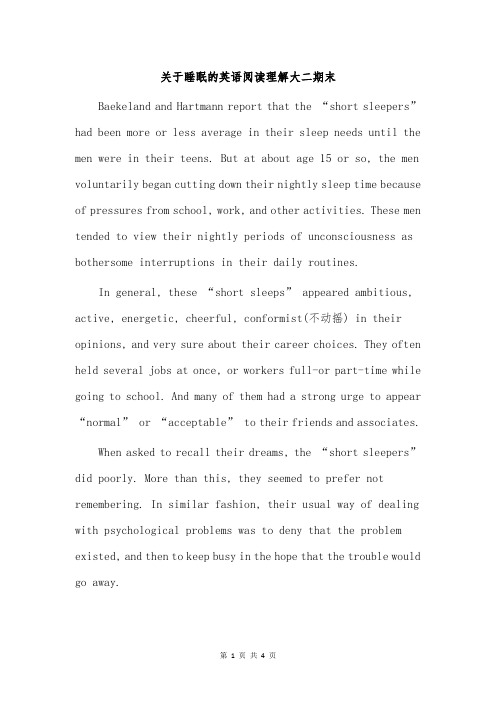
关于睡眠的英语阅读理解大二期末Baekeland and Hartmann report that the “short sleepers”had been more or less average in their sleep needs until the men were in their teens. But at about age 15 or so, the men voluntarily began cutting down their nightly sleep time because of pressures from school, work, and other activities. These men tended to view their nightly periods of unconsciousness as bothersome interruptions in their daily routines.In general, these “short sleeps” appeared ambitious, active, energetic, cheerful, conformist(不动摇) in their opinions, and very sure about their career choices. They often held several jobs at once, or workers full-or part-time while going to school. And many of them had a strong urge to appear “normal” or “acceptable” to their friends and associates.When asked to recall their dreams, the “short sleepers”did poorly. More than this, they seemed to prefer not remembering. In similar fashion, their usual way of dealing with psychological problems was to deny that the problem existed, and then to keep busy in the hope that the trouble would go away.The sleep patterns of the “short sleepers” were similar to, but less extreme than, sleep patterns shown by many mental patients categorized as manic(疯人). The “long sleepers” were quite different indeed. Baekeland and Hartmann report that these young men had been lengthy sleeps since childhood. They seemed to enjoy their sleep, protected it, and were quite concerned when they were occasionally deprived of their desired 9 hours of nightly bed rest. They tended to recall their dreams much better than did the “short sleepers.”Many of the “long sleepers” were shy, anxious, introverted (内向), inhibited (压抑), passive, mildly depressed, and unsure of themselves (particularly in social situations). Several openly states that sleep was an escape from their daily problems.1. According to the report,______.A) many short sleepers need less sleep by natureB) many short sleepers are obliged to reduce their nightly sleep time because they are busy with their workC) long sleepers sleep a longer period of time during the dayD) many long sleepers preserve their sleeping habit formed during their childhood2. Many “short sleepers” are likely to hold the view that _____.A) sleep is a withdrawal from the realityB) sleep interferes with their sound judgementC) sleep is the least expensive item on their routine programD) sleep is the best way to deal with psychological troubles3. It is stated in the third paragraph that short sleepers _____.A) are ideally vigorous even under the pressures of lifeB) often neglect the consequences of inadequate sleepC) do not know how to relax properlyD) are more unlikely to run into mental problems4. When sometimes they cannot enjoy adequate sleep, the long sleepers might ____.A) appear disturbedB) become energeticC) feel dissatisfiedD) be extremely depressed5. Which of the following is Not included in the passage?A) If one sleeps inadequately, his performance suffers and his memory is weakenedB) The sleep patterns of short sleepers are exactly the sane as those shown by many mental patientsC) Long and short sleepers differ in their attitudes towards sleepD) Short sleepers would be better off with more rest。
关于做梦的英语作文
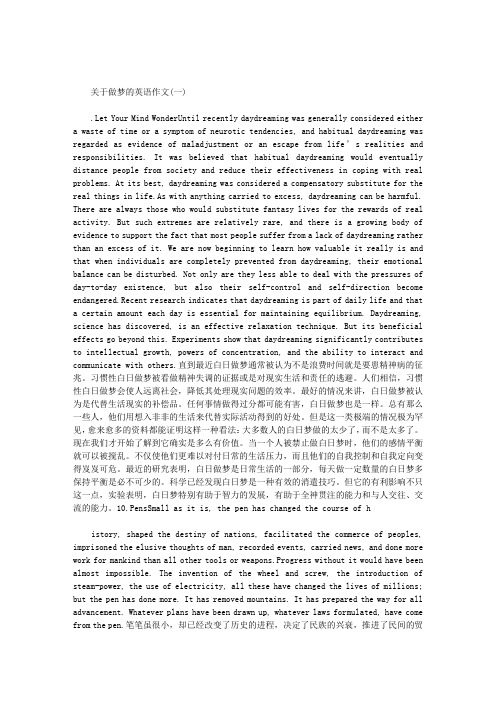
关于做梦的英语作文(一).Let Your Mind WonderUntil recently daydreaming was generally considered either a waste of time or a symptom of neurotic tendencies, and habitual daydreaming was regarded as evidence of maladjustment or an escape from life’s realities and responsibilities. It was believed that habitual daydreaming would eventually distance people from society and reduce their effectiveness in coping with real problems. At its best, daydreaming was considered a compensatory substitute for the real things in life.As with anything carried to excess, daydreaming can be harmful. There are always those who would substitute fantasy lives for the rewards of real activity. But such extremes are relatively rare, and there is a growing body of evidence to support the fact that most people suffer from a lack of daydreaming rather than an excess of it. We are now beginning to learn how valuable it really is and that when individuals are completely prevented from daydreaming, their emotional balance can be disturbed. Not only are they less able to deal with the pressures of day-to-day existence, but also their self-control and self-direction become endangered.Recent research indicates that daydreaming is part of daily life and that a certain amount each day is essential for maintaining equilibrium. Daydreaming, science has discovered, is an effective relaxation technique. But its beneficial effects go beyond this. Experiments show that daydreaming significantly contributes to intellectual growth, powers of concentration, and the ability to interact and communicate with others.直到最近白日做梦通常被认为不是浪费时间就是要患精神病的征兆。
英语阅读理解带翻译:用睡眠摆脱烦恼
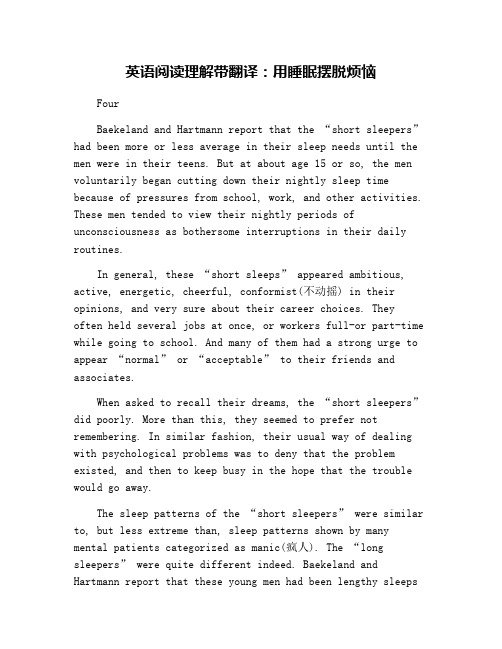
英语阅读理解带翻译:用睡眠摆脱烦恼FourBaekeland and Hartmann report that the “short sleepers” had been more or less average in their sleep needs until the men were in their teens. But at about age 15 or so, the men voluntarily began cutting down their nightly sleep time because of pressures from school, work, and other activities. These men tended to view their nightly periods of unconsciousness as bothersome interruptions in their daily routines.In general, these “short sleeps” appeared ambitious, active, energetic, cheerful, conformist(不动摇) in their opinions, and very sure about their career choices. They often held several jobs at once, or workers full-or part-time while going to school. And many of them had a strong urge to appear “normal” or “acceptable” to their friends and associates.When asked to recall their dreams, the “short sleepers” did poorly. More than this, they seemed to prefer not remembering. In similar fashion, their usual way of dealing with psychological problems was to deny that the problem existed, and then to keep busy in the hope that the trouble would go away.The sleep patterns of the “short sleepers” were similar to, but less extreme than, sleep patterns shown by many mental patients categorized as manic(疯人). The “long sleepers” were quite different indeed. B aekeland and Hartmann report that these young men had been lengthy sleepssince childhood. They seemed to enjoy their sleep, protected it, and were quite concerned when they were occasionally deprived of their desired 9 hours of nightly bed rest. They tended to recall their dreams much better than did the “short sleepers.”Many of the “long sleepers” were shy, anxious, introverted (内向), inhibited (压抑), passive, mildly depressed, and unsure of themselves (particularly in social situations). Several openly states that sleep was an escape from their daily problems.1. According to the report,______.A) many short sleepers need less sleep by natureB) many short sleepers are obliged to reduce theirnightly sleep time because they are busy with their workC) long sleepers sleep a longer period of time during the dayD) many long sleepers preserve their sleeping habit formed during their childhood2. Many “short sleepers” are likely to hold the view that _____.A) sleep is a withdrawal from the realityB) sleep interferes with their sound judgementC) sleep is the least expensive item on their routine programD) sleep is the best way to deal with psychological troubles3. It is stated in the third paragraph that short sleepers _____.A) are ideally vigorous even under the pressures of lifeB) often neglect the consequences of inadequate sleepC) do not know how to relax properlyD) are more unlikely to run into mental problems4. When sometimes they cannot enjoy adequate sleep, the long sleepers might ____.A) appear disturbedB) become energeticC) feel dissatisfiedD) be extremely depressed5. Which of the following is Not included in the passage?A) If one sleeps inadequately, his performance suffers and his memory is weakenedB) The sleep patterns of short sleepers are exactly the sane as those shown by many mental patientsC) Long and short sleepers differ in their attitudes towards sleepD) Short sleepers would be better off with more rest。
我做了一个梦小鸟会说话英语作文5句
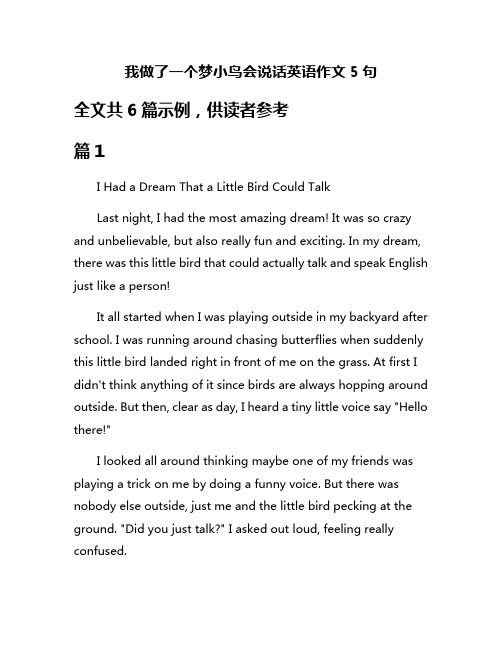
我做了一个梦小鸟会说话英语作文5句全文共6篇示例,供读者参考篇1I Had a Dream That a Little Bird Could TalkLast night, I had the most amazing dream! It was so crazy and unbelievable, but also really fun and exciting. In my dream, there was this little bird that could actually talk and speak English just like a person!It all started when I was playing outside in my backyard after school. I was running around chasing butterflies when suddenly this little bird landed right in front of me on the grass. At first I didn't think anything of it since birds are always hopping around outside. But then, clear as day, I heard a tiny little voice say "Hello there!"I looked all around thinking maybe one of my friends was playing a trick on me by doing a funny voice. But there was nobody else outside, just me and the little bird pecking at the ground. "Did you just talk?" I asked out loud, feeling really confused.The bird cocked its head and replied "Why yes, I absolutely can talk! Is that so strange?" I couldn't believe my ears! A talking bird was the last thing I expected to encounter on a normal afternoon."But how is this possible? Birds can't talk!" I exclaimed with total astonishment.The bird let out a little chuckle. "Well obviously some birds can talk, seeing as I am doing it right now! My name is Petrie, it's very nice to meet you."My jaw dropped open. A talking bird with a name! This had to be a dream, there's no way it could be real. But it all felt so lifelike and realistic. I decided to just go along with it and see what happened."Hi Petrie, I'm Sophie. This is so crazy, I must be dreaming! Can all birds talk, or is it just you?" I asked, unable to contain my burning curiosity.Petrie shook his little head. "No no, I'm the only talking bird around here. It's a special talent of mine. Not all birds can do it.""Wow, that's so cool!" I gushed. A million other questions started spinning through my mind. Where did he learn to talk?How long had he been able to do it? This was simply the most incredible thing ever.Petrie seemed to read my mind and continued. "I've been able to talk ever since I hatched from my egg as a baby bird. I taught myself by carefully listening to all the humans around me and practicing over and over until I could form the words just right."I was completely awestruck by this point. This little bird wasa genius! We spent the next while chatting and playing in the yard together as I peppered him with all my many questions about his life as a talking bird.Petrie told me about his quest to find the most delicious worms and insects to eat. He loved exploring the neighborhood and all the different backyards. I learned that birds have a very sharp eyesight that lets them see even the tiniest crumb of food from way up in the sky.He asked me about human life and what it's like going to school every day. I described my classes, friends, and activities like soccer practice and dance lessons. Petrie found it all fascinating since the world of birds and humans are usually so separated.As the sun started to go down, I knew my mom would be calling me inside soon for dinner. I was so disappointed because I still had a million other questions for Petrie and I never wanted this amazing dream to end!"Do you have to leave?" I asked sadly. "I wish you could just stay here and talk with me forever and ever."Petrie shook his little head again. "Sorry Sophie, but all dreams have to end at some point. No matter how fun and exciting they are. But maybe we'll see each other again another night and can pick up where we left off!"I gave Petrie a gentle hug around his soft feathery body. "Okay, I really hope so! Thanks for being my friend, even if you're just in a dream. You're the neatest, coolest talking bird ever!"Just then, I heard my mom's voice calling out for me to come inside. I looked down and Petrie was gone, flown away to wherever talking dream birds go when the dream is over."Sophie! Wake up honey, time for breakfast!" My mom's voice broke through again, but this time it was the real her and not just part of the dream.I blinked my eyes and looked around at my normal bedroom, feeling disappointed but also excited that I had experiencedsomething so magical and out of the ordinary. Who knows, maybe I'll have another dream about Petrie the talking bird again soon! A girl can hope, right?篇2我做了一个梦,小鸟会说话!昨晚,我做了一个特别奇妙的梦。
外研版五年级上册英语知识要点总结
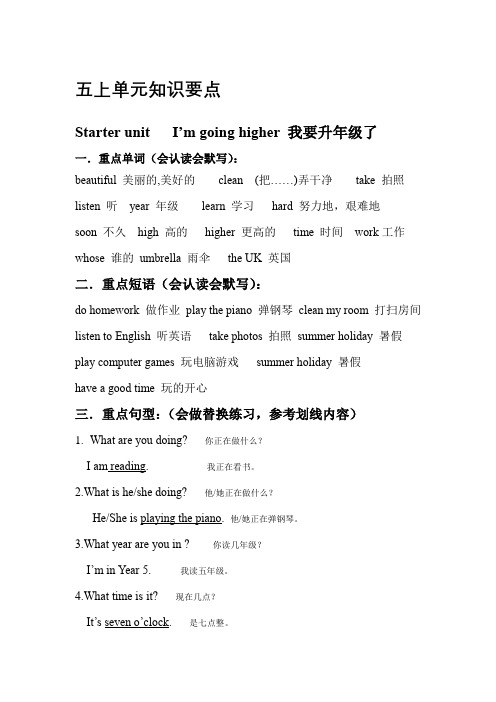
五上单元知识要点Starter unit I’m going higher 我要升年级了一.重点单词(会认读会默写):beautiful 美丽的,美好的clean (把……)弄干净take 拍照listen 听year 年级learn 学习hard 努力地,艰难地soon 不久high 高的higher 更高的time 时间work工作whose 谁的umbrella 雨伞the UK 英国二.重点短语(会认读会默写):do homework 做作业play the piano 弹钢琴clean my room 打扫房间listen to English 听英语take photos 拍照summer holiday 暑假play computer games 玩电脑游戏summer holiday 暑假have a good time 玩的开心三.重点句型:(会做替换练习,参考划线内容)1.What are you doing? 你正在做什么?I am reading. 我正在看书。
2.What is he/she doing? 他/她正在做什么?He/She is playing the piano. 他/她正在弹钢琴。
3.What year are you in ? 你读几年级?I’m in Year 5. 我读五年级。
4.What time is it? 现在几点?It’s seven o’clock. 是七点整。
5.Where is Ann from? Ann来自哪里?She is from Australia. 她来自澳大利亚。
6.What sport do you like best? 你最喜欢什么运动?Football. 足球。
Unit 1. My family 我的家庭一.重点单词(会认读会默写):mother 妈妈, father爸爸, grandmother (外)祖母, grandfather (外)祖父, parents父母, grandparents(外)祖父母, brother哥;弟, sister 姐;妹uncle 叔、伯、舅, aunt 姨、姑cousin 堂、婊兄弟;堂、婊姐妹farmer农民worker工人driver司机taxi driver出租车司机doctor医生nurse护士cook厨师wolf狼policeman警察man男人woman女人be 动词(am\is\are)搭配: I am \ We are , You are , They are \ He is , She is , It is我是我们是你(们)是他们是他是她是它是二.重点句型:(会做替换练习,参考括号内容)1.Are these \ those your parents ? 他们是你的父母吗?Yes , they are .\ No , they aren’t . 是的,他们是\ 不,他们不是2.Is he Emma’s brother ? 他是Emma的兄弟吗?Yes , he is . \ No , he isn’t . 是的,他是的\ 不,他不是的3.Are you Emma’s father ? 你是Emma的爸爸吗?Yes , I am . \ No , I’m not . 是的,我是\ 不,我不是4.Emma’s mother is a nurse . Emma的妈妈是一名护士。
双语阅读:午休打盹好处多
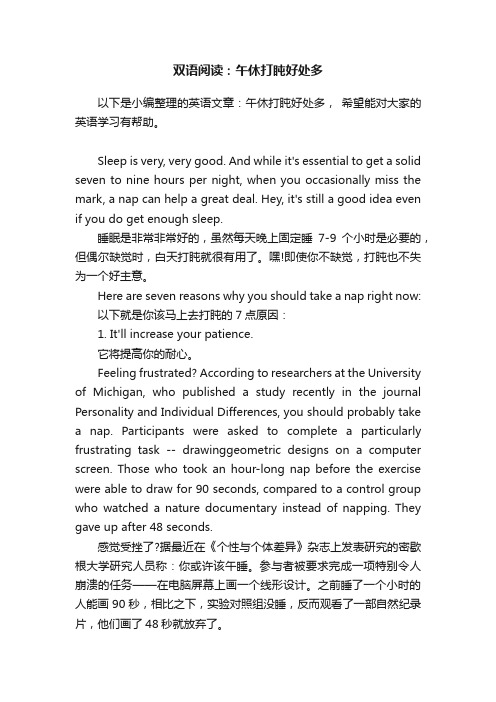
双语阅读:午休打盹好处多以下是小编整理的英语文章:午休打盹好处多,希望能对大家的英语学习有帮助。
Sleep is very, very good. And while it's essential to get a solid seven to nine hours per night, when you occasionally miss the mark, a nap can help a great deal. Hey, it's still a good idea even if you do get enough sleep.睡眠是非常非常好的,虽然每天晚上固定睡7-9个小时是必要的,但偶尔缺觉时,白天打盹就很有用了。
嘿!即使你不缺觉,打盹也不失为一个好主意。
Here are seven reasons why you should take a nap right now: 以下就是你该马上去打盹的7点原因:1. It'll increase your patience.它将提高你的耐心。
Feeling frustrated? According to researchers at the University of Michigan, who published a study recently in the journal Personality and Individual Differences, you should probably take a nap. Participants were asked to complete a particularly frustrating task -- drawinggeometric designs on a computer screen. Those who took an hour-long nap before the exercise were able to draw for 90 seconds, compared to a control group who watched a nature documentary instead of napping. They gave up after 48 seconds.感觉受挫了?据最近在《个性与个体差异》杂志上发表研究的密歇根大学研究人员称:你或许该午睡。
课文Day dream a little翻译

课文Day dream a little翻译做点白日梦“巴勃,你又在做白日梦啦?如果你那样消磨时间,你将一事无成!你就不能找点儿有用的事做做?”许多年轻人都听父亲讲过类似的话,而且直到最近,对待白日梦的这种敌视态度还是非常常见的。
做白日梦被认为是浪费时间,或者逃避现实生活及其职责的不健康行为。
但是,现在有些人对白日梦有了全新的看法。
有人认为做白日梦也许有益于健康。
人们对白日梦的态度正在变化,这与人们对夜间做梦的态度的变化非常相似。
人们一直认为夜间做梦打扰了他们所需要的的休息。
后来,研究者试图打断睡眠者的梦,但他们获悉,不让睡眠者做梦,他们就不能从休息中获益。
他们变得紧张不安,烦躁易怒,精神难以集中,他们的精神健康受到了暂时的损害。
要恢复健康,就得让他们做梦。
现在研究人员正发现白日梦对心理健康也很重要。
他们告诉我们,白日做梦是一种很好的休息方式。
但它们的好处并不仅限于此,一些心理学家进行过实验,得出一些令人吃惊的结论。
琼.T.弗雷伯格博士已得出结论,白日做梦会促进智力发展。
她说:“白日做梦还可以使人的注意力更集中,延长注意力集中的时间,并能增强与别人相处的能力。
对在校儿童进行的一项试验中,这位研究人员发现白日梦能使孩子们更加注意细节,他们感到更加愉快,能更好的合作。
另一名研究人员报告说,白日做梦似乎能改善自制力和创造力。
但这仅仅是事情的一部分。
有关白日做梦的最引人瞩目的事情也许是它们在按照我们的愿望塑造我们未来生活中的用处。
工业家亨利.J.凯泽认为,他的成功大部分应归功于对白日梦的积极利用。
他坚持认为“你可以想象你的未来”。
佛罗伦斯.南丁格尔曾梦想成为一名护士。
年轻时代的托马斯.爱迪生把自己想象成一个发明家。
对这些著名的成功者来说,似乎他们的白日梦变成了现实。
哈里.埃莫森.福斯迪克博士认为,我们想象自己是什么样子,结果往往就成为什么样子的人。
他个我们一个忠告,“在你心目中给自己树立一个形象…….这样你就会向这个形象靠拢。
关于睡觉和做梦的英语作文

关于睡觉和做梦的英语作文Sleeping and Dreaming。
Sleep is a vital part of our daily lives. It is a natural process that allows our bodies and minds to rest and rejuvenate. During sleep, we experience a variety of fascinating phenomena, including dreaming. In this article, we will explore the importance of sleep and delve into the mysterious world of dreams.First and foremost, sleep plays a crucial role in maintaining our overall health and well-being. It is during sleep that our bodies repair and regenerate cells, strengthen the immune system, and consolidate memories. Lack of sleep can have serious consequences, such as impaired cognitive function, weakened immune system, and increased risk of chronic diseases like diabetes and cardiovascular disorders. Therefore, it is essential to prioritize sleep and ensure we get enough rest each night.When we sleep, we go through different stages, each with its own characteristics. The first stage is light sleep, where we can be easily awakened. As we progress into deeper stages, our brain waves slow down, and our body relaxes even further. The final stage is REM (rapid eye movement) sleep, which is when most dreaming occurs. During REM sleep, our brain activity increases, resembling that of wakefulness, while our body remains in a state of muscle paralysis to prevent us from acting out our dreams.Dreaming is a fascinating phenomenon that has intrigued humans for centuries. It is a window into our subconscious mind, where we can experience a wide range of emotions, sensations, and scenarios. Dreams can be vivid and lifelike, or they can be fragmented and abstract. They often reflect our fears, desires, and unresolved issues. Some dreams may seem nonsensical, while others can be deeply meaningful and offer valuable insights into our lives.The exact purpose of dreaming is still a topic of debate among scientists and psychologists. Some theories suggest that dreams serve as a way for our brain to process and consolidate memories and emotions. Others propose that dreaming is a form ofproblem-solving, where our mind explores different scenarios and solutions to challenges we face in our waking life. Regardless of the exact function, dreams provide a unique opportunity for self-reflection and self-discovery.It is worth noting that not everyone remembers their dreams. This can be attributed to various factors, such as the depth of sleep, individual differences in dream recall, and the timing of waking up. However, keeping a dream journal and practicing techniques like lucid dreaming can enhance dream recall and enable us to explore the fascinating world of dreams more deeply.In conclusion, sleep and dreaming are integral parts of our lives. Sleep allows our bodies to rest and rejuvenate, while dreaming offers a glimpse into our subconscious mind. Understanding the importance of sleep and exploring the mysteries of dreams can enrich our lives and contribute to our overall well-being. So, let us embrace the wonders of sleep and cherish the extraordinary experiences that unfold in our dreams.。
关于夜晚做梦的英文作文

关于夜晚做梦的英文作文英文:Dreaming at night is a fascinating experience that everyone has. Sometimes, we remember our dreams vividly, while other times we forget them as soon as we wake up. I personally find it intriguing how our subconscious mind can create such vivid and sometimes bizarre scenarios.One of the most interesting things about dreaming at night is that we can experience things that are impossible in real life. For example, we can fly, breathe underwater, or even talk to deceased loved ones. It's like our mind is a canvas and our dreams are the paintbrush, allowing us to create whatever we want.However, not all dreams are pleasant. Nightmares can be terrifying and leave us feeling anxious or scared evenafter we wake up. I remember having a nightmare where I was being chased by a monster, and I couldn't run fast enoughto escape. It felt so real that I woke up sweating and with my heart racing.Despite the occasional nightmare, I still find dreaming at night to be a fascinating experience. It's like a window into our subconscious mind, and it can reveal things about ourselves that we may not have realized before. For example,I once had a dream where I was giving a speech in front ofa large audience, and I realized that I had a fear ofpublic speaking that I hadn't acknowledged before.Overall, dreaming at night is a mysterious and fascinating experience that I believe everyone should take the time to reflect on.中文:晚上做梦是一种迷人的体验,每个人都有过。
我做梦英语作文5句话
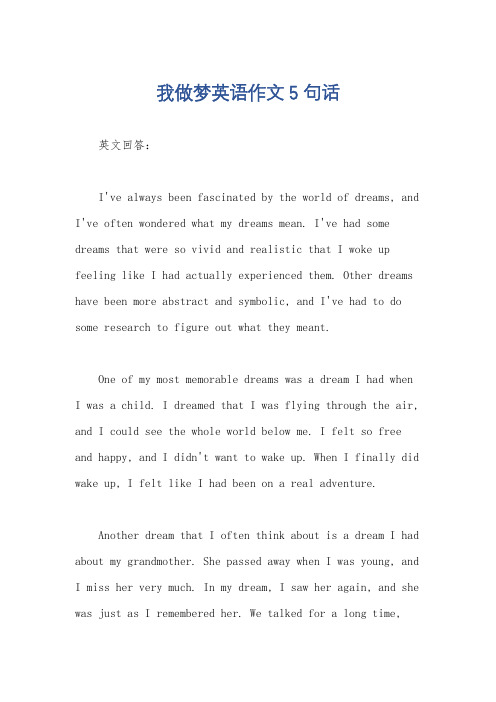
我做梦英语作文5句话英文回答:I've always been fascinated by the world of dreams, and I've often wondered what my dreams mean. I've had some dreams that were so vivid and realistic that I woke up feeling like I had actually experienced them. Other dreams have been more abstract and symbolic, and I've had to do some research to figure out what they meant.One of my most memorable dreams was a dream I had when I was a child. I dreamed that I was flying through the air, and I could see the whole world below me. I felt so free and happy, and I didn't want to wake up. When I finally did wake up, I felt like I had been on a real adventure.Another dream that I often think about is a dream I had about my grandmother. She passed away when I was young, and I miss her very much. In my dream, I saw her again, and she was just as I remembered her. We talked for a long time,and she told me how much she loved me. When I woke up, Ifelt like I had really been with her, and I felt so much better about her passing.Dreams can be a powerful tool for self-discovery and healing. They can help us to understand our emotions, our fears, and our desires. They can also help us to connectwith our loved ones who have passed away.If you're interested in learning more about your dreams, there are many resources available online and in libraries. You can also keep a dream journal, where you write downyour dreams as soon as you wake up. This can help you to remember your dreams and to track any patterns that you may notice.Dreams are a fascinating and mysterious part of human experience. They can be a source of joy, comfort, and insight. If you're open to exploring the world of dreams, you may be surprised by what you discover.中文回答:我一直对梦境世界着迷,我常常思考我的梦境意味着什么。
睡着做梦rem的英语阅读理解
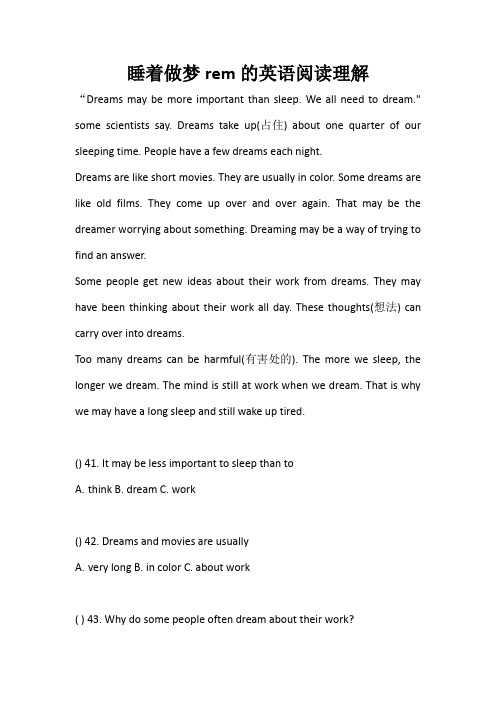
睡着做梦rem的英语阅读理解“Dreams may be more important than sleep. We all need to dream." some scientists say. Dreams take up(占住) about one quarter of our sleeping time. People have a few dreams each night.Dreams are like short movies. They are usually in color. Some dreams are like old films. They come up over and over again. That may be the dreamer worrying about something. Dreaming may be a way of trying to find an answer.Some people get new ideas about their work from dreams. They may have been thinking about their work all day. These thoughts(想法) can carry over into dreams.Too many dreams can be harmful(有害处的). The more we sleep, the longer we dream. The mind is still at work when we dream. That is why we may have a long sleep and still wake up tired.() 41. It may be less important to sleep than toA.thinkB. dreamC. work() 42. Dreams and movies are usuallyA.very longB. in colorC. about work( ) 43. Why do some people often dream about their work?A. Because they are tired in the daytime.B. Because they not interested in their work.C. Because they may be thinking about their work all day.()44. The main idea of the story is that____A. what dream isB. we always remember dreamsC. dreams are like movies( ) 45.Which sentence is RIGHT?A. It is good to sleep longer.B. We will feel tired after a long dream.C. The mind isn't work when we dream.考答案:41-45BBCAB。
做梦用英语怎么说
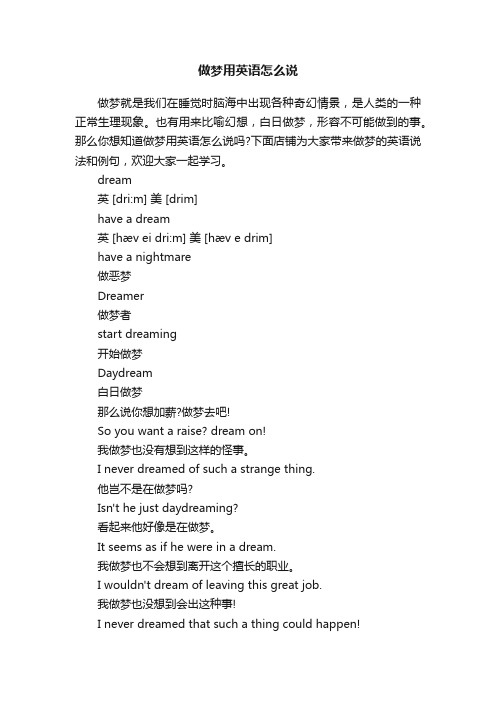
做梦用英语怎么说做梦就是我们在睡觉时脑海中出现各种奇幻情景,是人类的一种正常生理现象。
也有用来比喻幻想,白日做梦,形容不可能做到的事。
那么你想知道做梦用英语怎么说吗?下面店铺为大家带来做梦的英语说法和例句,欢迎大家一起学习。
dream英 [dri:m] 美 [drim]have a dream英[hæv ei dri:m] 美[hæv e drim]have a nightmare做恶梦Dreamer做梦者start dreaming开始做梦Daydream白日做梦那么说你想加薪?做梦去吧!So you want a raise? dream on!我做梦也没有想到这样的怪事。
I never dreamed of such a strange thing.他岂不是在做梦吗?Isn't he just daydreaming?看起来他好像是在做梦。
It seems as if he were in a dream.我做梦也不会想到离开这个擅长的职业。
I wouldn't dream of leaving this great job.我做梦也没想到会出这种事!I never dreamed that such a thing could happen!我做梦也没有想到,最终我会拥有这么一大笔财产。
I never dreamed that I would finish up owing such a lot of property.十年前,施正荣博士前创办尚德电力(Suntech)时,他做梦也没想过自己的太阳能电池板公司这么迅速就能达到现在这样的高度。
When he founded Suntech 10 years ago, Dr. Zhengrong Shi never dreamed his solar panel company would rise so far so fast.。
- 1、下载文档前请自行甄别文档内容的完整性,平台不提供额外的编辑、内容补充、找答案等附加服务。
- 2、"仅部分预览"的文档,不可在线预览部分如存在完整性等问题,可反馈申请退款(可完整预览的文档不适用该条件!)。
- 3、如文档侵犯您的权益,请联系客服反馈,我们会尽快为您处理(人工客服工作时间:9:00-18:30)。
During the past two decades, research has greatly expanded our knowledge about sleep and dreams. Scientists have identified various stages of sleep, and they have found that humans can function well on very little sleep, but only if they dream. Yet the true function of sleep and dreaming continues to elude precise explanation.
This means that if you get less sleep than normal - and people vary a great deal in how much sleep they normally require - you awake more friendly, more aggressive, and less sleepy.
Each of us has a special dream racter, a type of person whose appearance in our dreams makes us feel happier when we awake.
What we dream at night isn't as important to how we feel in the morning as the number of people who appear in our dreams. The more people, the better we feel.
If that sounds like far-fetched fantasy, consider these interesting findings that have emerged from eight years of sleep and dream research at the Veterans Administration Hospital in Cincinnati, Ohio:
The two researchers decided the key to whether we feel happy or unhappy after sleep must lie in sleep's psychological component - our dreams. So they began studying dream content - what dreamers dreamed and who appeared in their dreams - to see how this affected mood.
Once the two doctors established scientifically what common sense and folk wisdom had long taught - namely, that there is link between sleep and how we feel - they set out to learn what parts of our mood are related to which specific parts of the sleep cycle.
To Sleep, Perchance to Dream
So you awoke this morning in a miserable mood. Well, maybe your special dream character didn't put in an appearance last night, or maybe there just weren't enough people drifting through your dreams.
Instead of sleeping through the night, volunteers now were awakened four times while in REM sleep. They were asked about such things as what their dreams were about; the sex, age, identity, and number of the people in their dreams; and what each person in a dream was doing.
Kramer and Roth began by seeking to determine whether one's mood differs between night and morning, and whether this is related directly to sleep. They found that there is a difference, and its is definitely related to sleep. Then they explored the various aspects of mood and their relationship to the various stages of sleep and dreaming.
While sleep affects how sleepy, friendly, aggressive, and unhappy we feel after awakening, feelings of happiness or unhappiness depend most strongly on our dreams.
What does a good night's sleep mean to our mood Generally we are happier, less aggressive, sleepier, and a bit surprisingly, less friendly. Being sleepier is easily explained. It simply takes a little time to become fully alert after awakening.
Interestingly, Kramer and Roth found that being awakened four times a night didn't make a difference in the volunteers' morning mood patterns. But they did find that who appears in a dream has a far greater influence on mood than what occurs in the dream. "Who affects all the moods," Kramer says, "but primarily the unhappy mood."
At this point, the doctors found themselves puzzled. They knew from their earlier work that sleep determines if people feel happier. Yet when they studied the various sleep stages, they found no correlation between sleep physiology and the unhappy mood. Clearly sleep made a difference, but that difference didn't relate to how much time one spent in each of the various sleep stages.
Our sleep influences our mood. Our mood, in turn, affects our performance. And throughout the day, our levels of mood and performance remain closely linked.
Human experience suggests that they do. Certainly we generally feel better after a good night's sleep. But Drs. Kramer and Roth sought a much more definitive answer. And that answer, though still evolving, is positive yes.
Three types of mood are strongly related to some specific stage of sleep. Our friendly, aggressive, and sleepy feelings all relate to Stage 2 sleep, which accounts for most of our total sleep hours. Our friendly and sleepy feelings, but not our aggressive feelings, are affected as well by Stages 3 and 4, and by how long it takes us to fall asleep.
